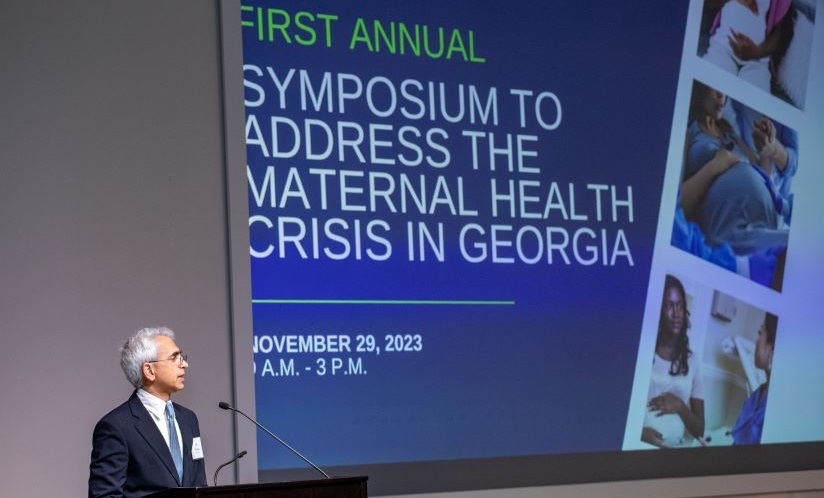Addressing the “Tipping Point” of Maternal Health in Georgia at Inaugural Symposium

Georgians are no strangers to the potential perils of pregnancy and birth. In the state, women are more than twice as likely to die during pregnancy or in the year following than the national average. Black women in Georgia are three times more likely to experience pregnancy complications than white women.
“Georgia’s problem with maternal death and illness has been known for a long time and people are passionate about working to address it, but we still haven’t been able to change those terrible statistics. One of the reasons why is because we’ve been working in silos… not sufficiently talking and listening to each other, and not addressing some of the root causes together,” says Daniele Fallin, PhD, dean of Rollins School of Public Health, at the first annual Symposium to Address the Maternal Health Crisis in Georgia.
The symposium was held Wednesday at Emory Conference Center and Hotel and brought together stakeholders to discuss opportunities to improve maternal health in the state. It was hosted by Emory University, Morehouse School of Medicine, Mercer University School of Medicine, and Research!America. Over 250 people were in attendance, including researchers, government officials, advocates, health care providers, community partners, and students.
In addition to inspiring speakers, panels, and community voices, the results of a statewide survey were also shared. This survey, commissioned by Research!America in partnership with the Woodruff Health Sciences Center at Emory University, outlined public opinion about maternal health, health equity, and health care in Georgia. It delivered some surprising results:
- 1 in 10 Georgians know someone who has died from pregnancy-related complications.
- Over half of all Georgians know someone who has experienced pregnancy complications.
- Improving the affordability of health care and access to insurance are Georgians’ top priorities to reduce maternal mortality.
Throughout the event, the collected experts underscored the importance of listening to and working with community members, in particular Black women. Personal stories, such as that shared by Heather Dobbs in a fireside chat led by Natalie Hernandez-Green, PhD, executive director of Morehouse School of Medicine’s Center for Maternal Health Equity, demonstrated this point. Dobbs recounted the story of her own “near miss” after dealing with complications during the birth of her second child, and discussed why stories like hers are important for researchers and legislators.
“We understand that with this crisis, we are not dealing with statistics,” says Ravi I. Thadhani, MD, executive vice president for health affairs at Emory University. “We are dealing with mothers, daughters, sisters, and the very core of what makes Georgians, Georgians—families, who are affected by this crisis.”
The invited speakers also highlighted the value of collaboration across sectors to improve maternal health. This means not only working with clinicians, but also legislators, community health workers, businesses, and other parties that could influence the public’s health. Addressing the gathered stakeholders in her keynote speech, Georgia Department of Public Health Commissioner Kathleen Toomey, MD, said she sees the passion and collaborative spirit of the attendees as a tipping point in the crisis.
“Let’s look collectively to harness this energy, because in this room are the ideas, the energy, the intellect, the science, as well as the commitment to the community that can make this happen,” Toomey says. “This is the tipping point. Help us push this tipping point into success for every woman and child in Georgia, at all levels of life.”